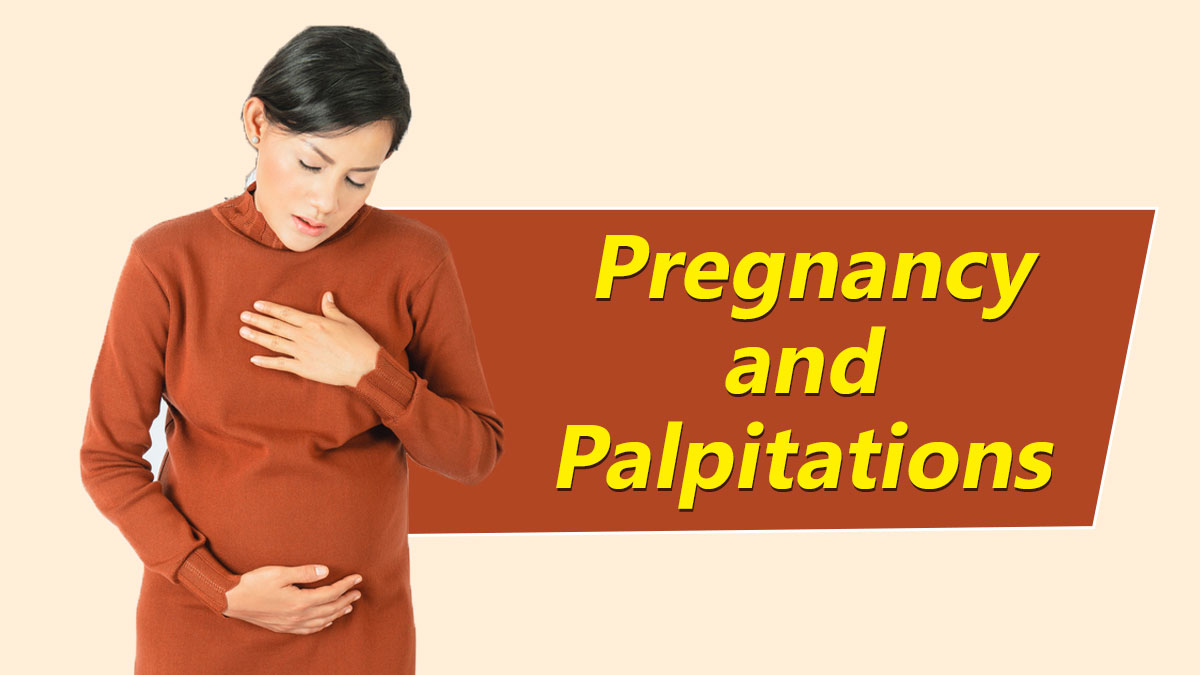
Palpitations, often known as fluttering, pounding, or racing sensations in the chest, can occur during pregnancy due to the body's increased blood volume. This greater volume causes the heart to pump faster, potentially contributing to a higher resting heart rate. While palpitations are usually harmless during pregnancy due to increased heart activity, they should be treated with caution because they may indicate an underlying health problem. We spoke to our expert Dr Anirban Biswas, Designation, MBBS, MD, FNIC, PGDD (USA), PGDC (UK), Madhukar Rainbow Children’s Hospital, Delhi, who explained the causes, risk factors, diagnosis, and treatment for heart palpitations during pregnancy.
Table of Content:-
Causes Of Heart Palpitations

According to a 2007 study, during pregnancy, there's typically a 25% increase in heart rate, making sinus tachycardia, especially in the third trimester, quite common. More than half of pregnant women experiencing palpitations are found to have ectopic beats and non-sustained arrhythmia, whereas sustained tachycardias are less frequent, occurring in only around 2-3 out of 1000 cases.
Dr Biswas listed the causes of heart palpitations as follows:
Hormonal Changes
“Fluctuations in hormones, particularly oestrogen and progesterone, are common during pregnancy. Progesterone, in particular, increases significantly, which can affect the heart's electrical activity and lead to palpitations”, said Dr Biswas.
Increased Blood Volume
The body produces more blood during pregnancy to supply nutrients and oxygen to the developing baby. This increased blood volume can put additional strain on the heart, causing it to work harder and potentially leading to palpitations.
Also Read: Preventing Preterm Birth: Expert Explains Strategies To Ensure Full-Term Pregnancy

Changes in Blood Pressure
Pregnancy can cause fluctuations in blood pressure due to changes in blood volume, hormonal shifts, and the expansion of blood vessels. High or low blood pressure levels can contribute to palpitations, added Dr Biswas.
Stress and Anxiety
Pregnancy can increase emotional tension and anxiety as heightened emotions can stimulate the release of adrenaline, impacting heart rate and rhythm.
Risk Factors Affecting Palpitations in Pregnancy

Dr Biswas listed the risk factors affecting palpitations in pregnancy as follows:
- Pre-existing Heart Conditions, such as arrhythmias, valve disorders, or congenital heart defects.
- Advanced Maternal Age (> 35 years)
- Multiple Gestation
- Obesity
- Gestational Diabetes
- Thyroid Disorders
- Anaemia
- Psychiatric disorders
- Increased Physical activity
When To Seek Help
You should seek medical help if you experience palpitations accompanied by severe dizziness, fainting, chest pain, or shortness of breath. Any palpitations that interfere with everyday activities or sleep require immediate medical intervention to safeguard the mother's and her baby's health.
How to Diagnose
Dr Biswas said, “Diagnostic tests may include an Electrocardiogram (ECG), Echocardiogram (2D-ECHO), blood tests (to check for anaemia or thyroid disorders), and possibly a Holter monitor for continuous heart rhythm monitoring. Your healthcare provider will decide the appropriate tests are necessary based on your symptoms and medical history.”
Treatment for Palpitations During Pregnancy

Treatment typically involves managing underlying causes and alleviating symptoms. Dr Biswas listed some practical tips that you should follow:
- Stay Hydrated: Drink plenty of water throughout the day to maintain hydration, which can help regulate heart rhythm and prevent palpitations.
- Balanced Diet: Consume a nutritious diet rich in fruits, vegetables, lean proteins, and whole grains to support overall heart health and minimise palpitation triggers.
- Limit Stimulants: Avoid or limit intake of caffeine, nicotine, and alcohol, as these substances can exacerbate palpitations.
- Manage Stress: Practise relaxation techniques, such as deep breathing, meditation, or prenatal yoga to reduce stress and anxiety, which can trigger palpitations.
- Regular Exercise: Engage in low-impact exercises approved by your healthcare provider to promote cardiovascular fitness and support overall heart health during pregnancy.
Bottomline
Dr Biswas concluded, “It is important to mention pre-existing conditions and symptoms to doctors to receive personalised counsel and support throughout this transforming journey. If the symptoms are severe, a doctor may prescribe medicine to help control the heartbeat. To seek support and guidance when experiencing palpitations or any concerning symptoms is a must. It is important to note that the well-being of a mother and her baby is a top priority.”
[Disclaimer: This article contains information provided by an expert and is for informational purposes only. Hence, we advise you to consult your expert if you notice any issues during pregnancy to avoid complications.]
Also watch this video
How we keep this article up to date:
We work with experts and keep a close eye on the latest in health and wellness. Whenever there is a new research or helpful information, we update our articles with accurate and useful advice.
Current Version